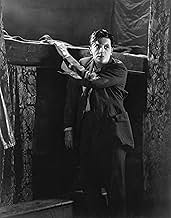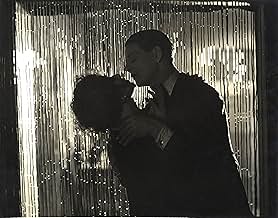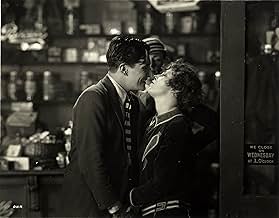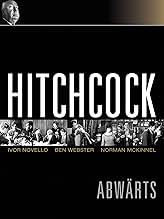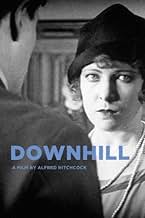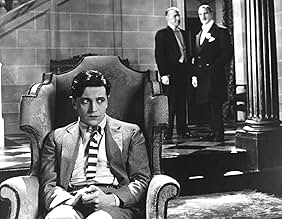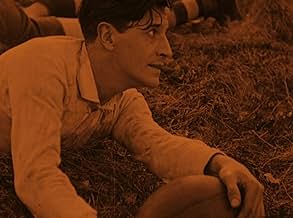IMDb RATING
6.0/10
3.4K
YOUR RATING
Bound by honor, a successful schoolboy takes the blame for his roommate's indiscretion, and it's all downhill from there.Bound by honor, a successful schoolboy takes the blame for his roommate's indiscretion, and it's all downhill from there.Bound by honor, a successful schoolboy takes the blame for his roommate's indiscretion, and it's all downhill from there.
Constance Collier
- Dance Hall Lady with Purse
- (uncredited)
Daisy Jackson
- The Seductive Waitress
- (uncredited)
Featured reviews
'Downhill' is visually inventive and astonishing, but the story is nothing more than simple flat melodrama. Script is based on the play "Down Hill" written by Constance Collier and the film's star Ivor Novello. Roddy Berwick (Ivor Novello) and Tim Wakely (Robin Irvine) are best buddies attending expensive private school. Soon after both boys spend an evening with waitress (Annette Benson), she comes forward and says she's pregnant. She accuses Roddy, who comes from the rich family, being the father, while the real one is Tim. Roddy promises to keep his mouth to protect Tim, who might lose his scholarship. Roddy gets expelled from school, and thrown out at home by his father. Roddy falls deeper and deeper after being used by different people. Hitchcock fantastically depicts Roddy's descent after each dramatic episode with showing Novello's character going down on stairs, on escalators and with elevator.
Not the Hitchcock's best movie - directing is marvelous, but the story is just too simple and predictable. On the other hand, it is very easy to care about the main character and despise the cruel people who but other persons through unfair grind (even when things happen thanks to Roddy's own naivety).
P.S. At that time (in August, 2018) the film's theme is still relative.
Not the Hitchcock's best movie - directing is marvelous, but the story is just too simple and predictable. On the other hand, it is very easy to care about the main character and despise the cruel people who but other persons through unfair grind (even when things happen thanks to Roddy's own naivety).
P.S. At that time (in August, 2018) the film's theme is still relative.
I watched Alfred Hitchcock's DOWNHILL (1927) starring Ivor Novello. I thought this was a fascinating film although it's not very well regarded.
Novello plays a wealthy Oxford student who stupidly takes the blame after a vindictive waitress points him out (his father is rich) as her seducer. The real seducer is his friend, but he takes the blame, assuming it will all blow over. But he gets expelled and sent home where his father pitches a fit and calls him a liar. Novello storms out of the house.
Cast into the cruel world, Novello must find his own way. In a brilliant sequence, following an intertitle that announces "make believe" we see a well dressed Novello holding a cup of coffee, but as the camera pulls back we see that he is holding a tray and serving coffee to a flashy couple (Isabel Jeans, Ian Hunter). Well at least he has a job! But then as the couple heads to the dance floor the camera pulls back again and we suddenly realize that, as the couple starts dancing, they are on a stage. The audience comes into view and a line of high-kicking dancers races out onto the stage.
Jeans turns out to be a selfish woman involved with Hunter. There is never enough money. Novello becomes a hanger-on until he receives a telegram with news about an inheritance. Jeans quickly marries Novello and starts spending freely. Time passes. Jeans and Hunter are sitting in a lavish bedroom. She's endlessly sitting at dressing tables, admiring herself and her jewels. Novello comes home and find a pile of bills, an overdrawn notice from the bank, and Hunter in the closet. The apartment is in her name and he's thrown out into the cruel world.
Next we find Novello as a taxi dancer in Paris. He seems to have a "manager" who sells his dances and possibly more. While he dances we see a middle-aged age woman (Violet Farebrother) sitting at a table. She can't take her eyes off him. She arranges for an introduction. He babbles away, telling her his sad story while her eyes frankly devour him. Amazing sequence. But as morning dawns and the blinds are raised, Novello finally see this tawdry world of drunks and dissolutes and once again goes out into the cruel world to Marseilles.
Sick and broke, Novello is saved by a pair of sailors and put on a ship back to England after they find a returned letter. Do they think there will be a reward? During the voyage, Novello hallucinates and relives his past accounts with all the horrid women in his life. This is a beautifully done scene. Finally he arrives home.
I cannot think of another film from this era where the male is the societal victim and who, through nobility, suffers as he descends to the depths at the hands of women. Novello is actually playing a twist on the many Ruth Chatterton roles where she follows this sort of journey to find redemption and/or death. Along with The Lodger, this may be Ivor Novello's best film performance.
As for Hitchcock, there are many great scenes here and lots of symbolism as Novellos is seen on escalators and elevators going down, down, DOWN.
Novello plays a wealthy Oxford student who stupidly takes the blame after a vindictive waitress points him out (his father is rich) as her seducer. The real seducer is his friend, but he takes the blame, assuming it will all blow over. But he gets expelled and sent home where his father pitches a fit and calls him a liar. Novello storms out of the house.
Cast into the cruel world, Novello must find his own way. In a brilliant sequence, following an intertitle that announces "make believe" we see a well dressed Novello holding a cup of coffee, but as the camera pulls back we see that he is holding a tray and serving coffee to a flashy couple (Isabel Jeans, Ian Hunter). Well at least he has a job! But then as the couple heads to the dance floor the camera pulls back again and we suddenly realize that, as the couple starts dancing, they are on a stage. The audience comes into view and a line of high-kicking dancers races out onto the stage.
Jeans turns out to be a selfish woman involved with Hunter. There is never enough money. Novello becomes a hanger-on until he receives a telegram with news about an inheritance. Jeans quickly marries Novello and starts spending freely. Time passes. Jeans and Hunter are sitting in a lavish bedroom. She's endlessly sitting at dressing tables, admiring herself and her jewels. Novello comes home and find a pile of bills, an overdrawn notice from the bank, and Hunter in the closet. The apartment is in her name and he's thrown out into the cruel world.
Next we find Novello as a taxi dancer in Paris. He seems to have a "manager" who sells his dances and possibly more. While he dances we see a middle-aged age woman (Violet Farebrother) sitting at a table. She can't take her eyes off him. She arranges for an introduction. He babbles away, telling her his sad story while her eyes frankly devour him. Amazing sequence. But as morning dawns and the blinds are raised, Novello finally see this tawdry world of drunks and dissolutes and once again goes out into the cruel world to Marseilles.
Sick and broke, Novello is saved by a pair of sailors and put on a ship back to England after they find a returned letter. Do they think there will be a reward? During the voyage, Novello hallucinates and relives his past accounts with all the horrid women in his life. This is a beautifully done scene. Finally he arrives home.
I cannot think of another film from this era where the male is the societal victim and who, through nobility, suffers as he descends to the depths at the hands of women. Novello is actually playing a twist on the many Ruth Chatterton roles where she follows this sort of journey to find redemption and/or death. Along with The Lodger, this may be Ivor Novello's best film performance.
As for Hitchcock, there are many great scenes here and lots of symbolism as Novellos is seen on escalators and elevators going down, down, DOWN.
.. based on a play by star Ivor Novello. He plays Roddy Berwick, the big man on campus at a prestigious private school. He enjoys rugby and spending time with his best chum Tim Wakely (Robin Irvine). Tim has a dalliance with a girl of "low morals", and when she becomes pregnant, she spitefully blames Roddy, who out of loyalty to his buddy Tim accepts the blame is expelled from school. This sets him on a path "downhill" away from his promising future, towards a wretched existence as a bit actor and male prostitute.
This is rather corny and overlong, although those interested in Novello, a huge star of stage and screen in the UK in first half of the 20th century, will most likely get more out of it. Hitchcock shows off a few camera tricks and artistic shots, like a lingering scene of Novello descending an escalator into the Underground rail as a symbol of his societal descent. I also thought it rare to see a male prostitute in a film of this era, even though female pros seem to figure into every other silent film.
This is rather corny and overlong, although those interested in Novello, a huge star of stage and screen in the UK in first half of the 20th century, will most likely get more out of it. Hitchcock shows off a few camera tricks and artistic shots, like a lingering scene of Novello descending an escalator into the Underground rail as a symbol of his societal descent. I also thought it rare to see a male prostitute in a film of this era, even though female pros seem to figure into every other silent film.
I just watched this film which I purchased on Ebay. I am a fan of Ivor Novello primarily because of his operatic musicals of the thirties and forties. I saw The Lodger recently and was impressed with his performance, read a biography or two, enjoyed Jeremy Northam's portrayal in Gosford Park, and am hunting for other performances in the cinema. This movie is very well done and adds an interesting insight into Hitchcock's early career. The quality of the acting, photography, use of symbolism are undeniable. I thought the impression that women are a bit dangerous was a major point but at least his mother cared about him although she didn't seem to resist his father's impulsive banishment. This is a film which held my interest throughout and I highly recommend it.
Classmates and close friends at an English public school, Roddy Berwick and Tim Wakely compete for the affections of a local shop girl. When the girl falsely accuses Roddy of getting her pregnant, he is expelled. However, Roddy remains silent to protect Tim, who was the guilty party, and the friends make a pact to keep silent. Outraged at his expulsion, Roddy's father does not believe his son's claims of innocence and throws him out. Thus, Roddy strikes out on his own, and his life begins a downward spiral from stage acting to a disastrous marriage to taxi dancing to the Marseilles waterfront. "When Boys Leave," also known as "Downhill," was Alfred Hitchcock's fifth completed film, and, early on in his career, the master director explores his oft-repeated theme of the wrongfully accused.
Shot in 1927, the film is silent with inter-titles, and the black-and-white cinematography is often well lit with striking visual compositions. However, Hitchcock generally holds the camera steady, and movement occurs within the frame. The film lacks the camera fluidity common among movies of the late silent era, although Hitchcock is already a master of visual story-telling, and the inter-titles are brief and sparse. As Roddy's life reels out of control, he is dwarfed by his surroundings in rooms with impossibly high ceilings and doors that are more than twice his height. Fortunately, Hitchcock elicits naturalistic performances from his cast, and none indulges in the grand style of acting that negatively stereotyped silent movies. Ivor Novello, a Welsh matinée idol best known for his musical talents, plays the suffering Roddy quite well. Isabel Jeans as Julia Fotheringale, a spendthrift actress, and Ian Hunter as Archie, Julia's shady lover, provide amusing support during one colorful episode in Roddy's descent.
"When Boys Leave" is from Hitchcock's apprentice period in England, when he was still learning the craft. While the story is thin, and the motivations vague, this short silent film shows flashes of the genius to come, and, for students of the master, every Hitchcock film is worthwhile viewing.
Shot in 1927, the film is silent with inter-titles, and the black-and-white cinematography is often well lit with striking visual compositions. However, Hitchcock generally holds the camera steady, and movement occurs within the frame. The film lacks the camera fluidity common among movies of the late silent era, although Hitchcock is already a master of visual story-telling, and the inter-titles are brief and sparse. As Roddy's life reels out of control, he is dwarfed by his surroundings in rooms with impossibly high ceilings and doors that are more than twice his height. Fortunately, Hitchcock elicits naturalistic performances from his cast, and none indulges in the grand style of acting that negatively stereotyped silent movies. Ivor Novello, a Welsh matinée idol best known for his musical talents, plays the suffering Roddy quite well. Isabel Jeans as Julia Fotheringale, a spendthrift actress, and Ian Hunter as Archie, Julia's shady lover, provide amusing support during one colorful episode in Roddy's descent.
"When Boys Leave" is from Hitchcock's apprentice period in England, when he was still learning the craft. While the story is thin, and the motivations vague, this short silent film shows flashes of the genius to come, and, for students of the master, every Hitchcock film is worthwhile viewing.
Did you know
- TriviaThe £30,000 Roddy inherits would have equated to about $143,000 at the time (in 1927), and that amount equals over $2.5M in 2023.
- GoofsWhen Roddy and the girl are dancing in the candy shop, a gramophone record of a tune called "I Want Money" is shown. It's on the old "WINNER" label. In a flashback, it's playing again on the record player, but in a further flashback, in a montage, the record has become a "His Master's Voice" disc.
- Quotes
[first title card]
Title Card: Here is a tale of two school-boys who made a pact of loyalty. One of them kept it - at a price.
- ConnectionsFeatured in Shepperton Babylon (2005)
- SoundtracksI Want Some Money
Words by Herbert Rule & Fred Holt.
Music by L. Silberman.
Played on the gramophone machine by Mabel; even though Downhill is a silent film, the accompanying music would have referenced this song as it underscores elements of the plot.
Details
Box office
- Gross worldwide
- $158
- Runtime
- 1h 20m(80 min)
- Color
- Sound mix
- Aspect ratio
- 1.33 : 1
Contribute to this page
Suggest an edit or add missing content

